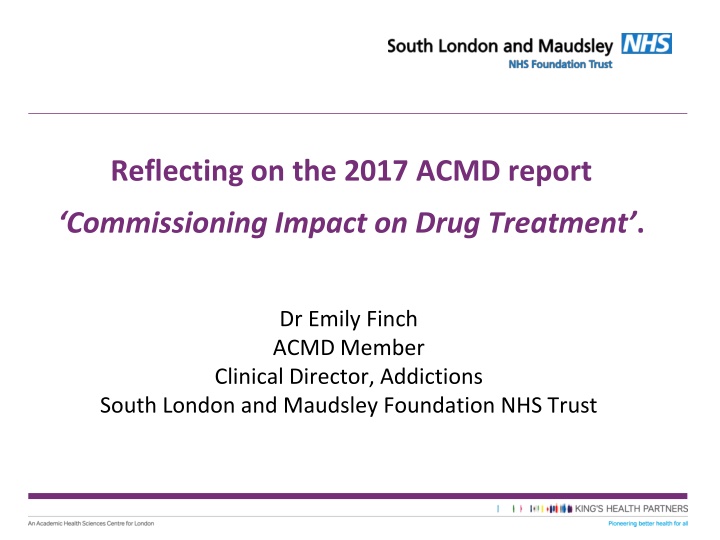
Impact of Commissioning on Drug Treatment: Insights and Recommendations
Exploring the findings, conclusions, and recommendations from the 2017 ACMD report on the impact of commissioning on drug treatment. Highlights include structural changes, funding reductions, workforce effects, and capacity for clinical research. Recommendations urge protection of investment levels and transparent financial reporting to enhance effectiveness and quality of drug and alcohol treatment services.
Download Presentation

Please find below an Image/Link to download the presentation.
The content on the website is provided AS IS for your information and personal use only. It may not be sold, licensed, or shared on other websites without obtaining consent from the author. If you encounter any issues during the download, it is possible that the publisher has removed the file from their server.
You are allowed to download the files provided on this website for personal or commercial use, subject to the condition that they are used lawfully. All files are the property of their respective owners.
The content on the website is provided AS IS for your information and personal use only. It may not be sold, licensed, or shared on other websites without obtaining consent from the author.
E N D
Presentation Transcript
Reflecting on the 2017 ACMD report Commissioning Impact on Drug Treatment . Dr Emily Finch ACMD Member Clinical Director, Addictions South London and Maudsley Foundation NHS Trust KHP_M_oneline_descriptor.png
The Recovery Committee of the ACMD considered evidence from a broad spectrum of sources, including: a review of published literature on changes in health, social care and criminal justice commissioning; financial data on drug and alcohol misuse treatment; surveys of substance misuse providers; an online survey of and interviews with substance misuse commissioners; two professional membership bodies; Public Health England; drug and alcohol misuse treatment providers; and directors of public health.
Findings Structural changes in commissioning Move to public health and local authority commissioning. Some advantages but negative consequences Reduction in overall levels of funding Difficult to establish full picture due to lack of comparable financial data Frequent re procurement Negative consequence for services, costly and disruptive. Effects on workforce. 4 /
Conclusions Consideration must be given to how levels of investment can be protected Quality and effectiveness is being compromised by under resourcing Increasing disconnect between treatment and other health pathways Frequent re procurement is costly and disruptive and effects outcomes Current commissioning structures are impacting on capacity for clinical research 5 /
Recommendations and responses National and local government should give serious consideration to how current levels of investment can be protected, including mandating drug and alcohol misuse services within local authority budgets and/or placing the commissioning of drug and alcohol treatment within NHS commissioning structures. Response local government is best placed to assess and meet the need for public health interventions, including substance misuse treatment National government should ensure more transparent and clear financial reporting on local drug misuse treatment services, together with new mechanisms to challenge local disinvestment or falls in treatment penetration. Response the current system of reporting of spending by local authorities provides a clear and open record of actual spend on drug misuse services, which fulfils the needs for transparency 6 /
Recommendations and responses National bodies should develop clear standards, setting out benchmarks for service costs and staffing to prevent a drive to the bottom and potentially under- resourced and ineffective services. Response there is already sufficient national guidance in place The Government s new Drug Strategy Implementation Board should ask PHE and the Care Quality Commission to lead or commission a national review of the drug misuse treatment workforce. Response we are committed .to working with Health Education England 7 /
Recommendations and responses Local and national government should consider strengthening links between local health systems and drug misuse treatment. In particular, drug misuse treatment should be included in clinical commissioning group commissioning and planning initiatives, such as local Sustainability and Transformation Plans (STPs). Response We accept this recommendation Commissioners should ensure that recommissioning drug misuse treatment services is normally undertaken in cycles of five to ten years, with longer contracts (longer than three years) and careful consideration of the unintended consequences of recommissioning. Response commissioners have a broad range of other mechanisms at their disposal to enhance quality and outcomes, such as performance management and collaborative approaches Maybe?? 8 /
Recommendations and responses The Government s new Drug Strategy Implementation Board should address research infrastructure and capacity within the drugs misuse field. Response The Government accepts this recommendation 9 /






















